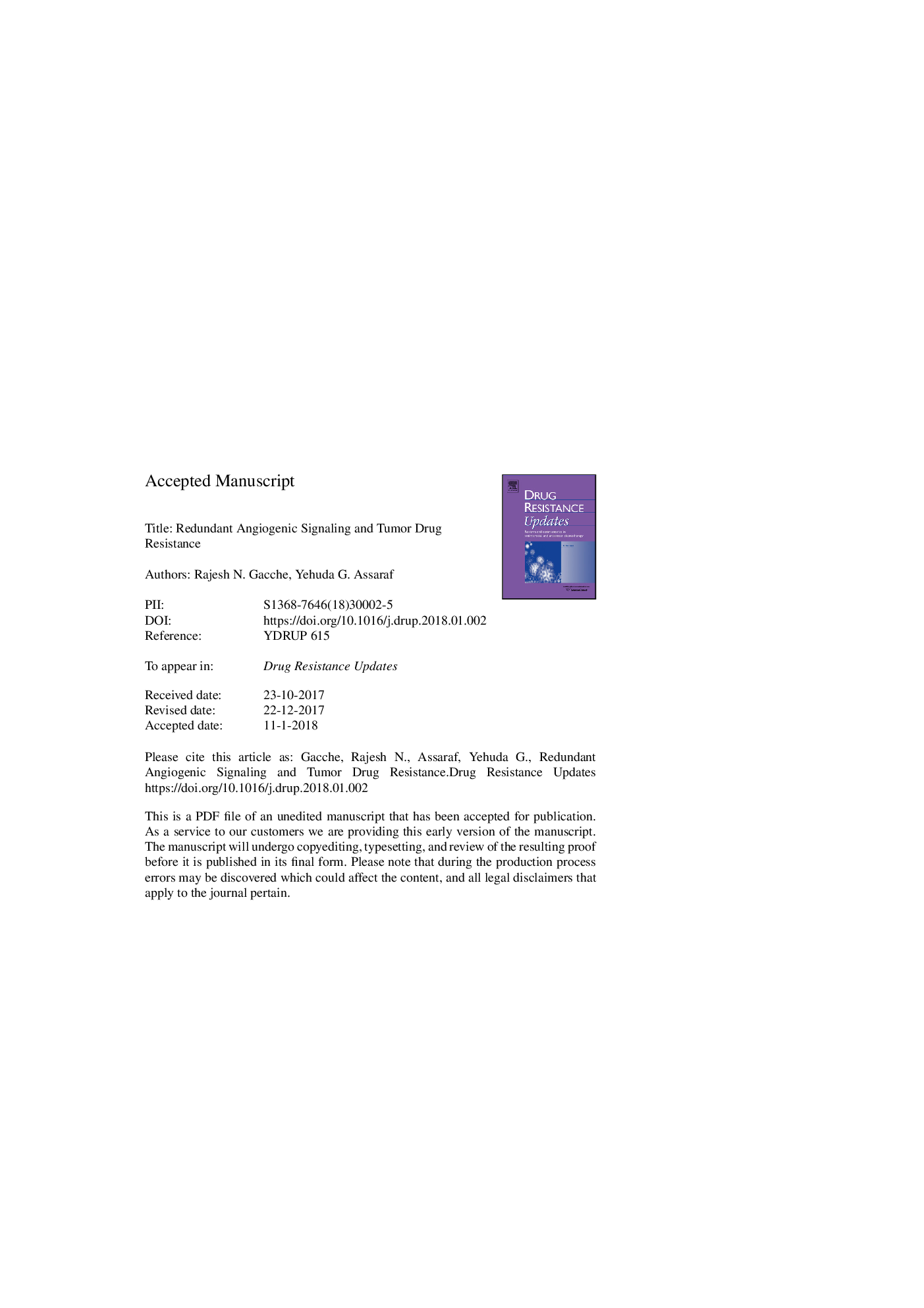| Article ID | Journal | Published Year | Pages | File Type |
|---|---|---|---|---|
| 8436506 | Drug Resistance Updates | 2018 | 99 Pages |
Abstract
Angiogenesis research in the past two decades has contributed significantly towards understanding the molecular pathophysiology of cancer progression and inspired target-oriented research and pharma industry for the development of novel anti-angiogenic agents. Currently, over eleven drugs targeting angiogenesis have been approved by the FDA for the treatment of various malignancies. Of the registered anti-angiogenic clinical trials until the end of 2017 (ClinicalTrials.gov), over 47% were completed, 10% were terminated, 3% withdrawn, over 0.5% were suspended and only 4 trials have culminated in FDA approval for marketing. On the one hand, the clinical benefits of anti-angiogenic drugs prompted the development of novel anti-angiogenic agents. On the other hand, however, a plethora of recent studies demonstrated the emergence of tumor drug resistance towards currently used anti-angiogenic therapeutics. Series of preclinical and clinical studies have highlighted the enigma of drug resistance with functional bypass pathways, and identified compensatory or alternative angiogenic mechanisms assuring tumor growth in the midst of an anti-angiogenic stress environment. In the present review the classical literature of such redundant angiogenic pathways in concert with the key angiogenic factors and specialized cells involved in anti-angiogenic escape mechanisms is described. A strategic discourse regarding increasing tumor drug resistance and future modalities for anti-angiogenic therapy is also discussed in view of recent advances.
Keywords
ECMEGFRNF-κBPI3KTNBCEGFTNFαMDRCOXMmpsNRPEMACSCsmTORTGFβFAKFGFERKImgRASHUVECTCFRAFDSLGBMHIF-1αPKCSCIDENGCXCR4EPCsGSK3βBcl-xLALK1MMTVSCFWntBMDCsCCLPDGFFGFRPericytesNICDVHLSDF-1αCXCLRCCHGFZEB2TIE2PlGFVEGFRM-CSFPDGFRαSMARTKCAFsFZDfrizzledJagged-1PNETsEndoglinJAG1CSF-1Zinc finger E-box binding homeobox 2colony stimulating factor-1TAMsPHD2C-C motif ligandCirculating endothelial progenitorsTEMSTAFsBv8FDAVDACEPSProlyl hydroxylase 2PyMTC-X-C motif ligandJanus kinasec-Metdll4ECsMAPKSTATcyclooxygenaseangiopoietinAngiogenesisEuropean Medicines agencyvon Hippel-Lindauhydroxyeicosatetraenoic acidEphα-smooth muscle actininterleukintransforming growth factor-βvasculogenic mimicryTumor associated macrophagestumor necrosis factor αPancreatic neuroendocrine tumorsEMTcluster differentiationAnti-angiogenic drugsNotch intracellular domainPCsFood and Drug AdministrationNSCLCNon-small cell lung cancerTriple-negative breast cancerHuman umbilical vein endothelial cellsbone marrow derived cellsEndothelial progenitor cellsEndothelial cellsCancer stem cellsT-cell factorVascular disrupting agentshypoxia inducible factor 1αepidermal growth factorplacental growth factorHepatocyte growth factorGranulocyte-colony stimulating factorVascular endothelial growth factorVascular Endothelial Growth Factor (VEGF)platelet derived growth factorfibroblast growth factorStem Cell FactorG-CSFnuclear factor-κBPhosphatidylinositol 3-kinaseTumor-associated fibroblastsrapidly accelerated fibrosarcomaB-cell lymphoma-extra largeextra cellular matrixSignal transducer and activator of transcriptionMatrix metalloproteinasesBMPbone marrowMultidrug resistanceNeuropilinmammalian target of rapamycinHETEMouse mammary tumor virusBone morphogenetic proteinProtein kinase Cmitogen-activated protein kinaseplatelet derived growth factor receptorJAKRenal cell carcinomasevere combined immunodeficiencyCOUP-TFIIextracellular signal-regulated kinasefocal adhesion kinaseEpithelial-mesenchymal transitionGlioblastoma multiformeReceptor Tyrosine Kinasevascular endothelial growth factor receptorEpidermal growth factor receptorfibroblast growth factor receptor
Related Topics
Life Sciences
Biochemistry, Genetics and Molecular Biology
Cancer Research
Authors
Rajesh N. Gacche, Yehuda G. Assaraf,
